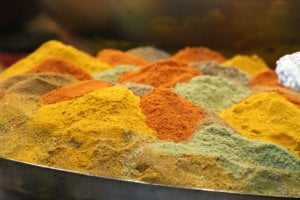5 Interesting Facts About Middle East Food History
If you are new to Middle Eastern dishes, it can be intimidating to try. But ask any fans and they will soon tell you tales of cultural foods that are not only delicious to taste, but healthy to the body and filling to the soul. Exotic, glorious and scrumptious, let’s dive into some of the most interesting facts about Middle East food you need to know.

1. History
The history of the Middle East can be traced to nearly the beginning of humanity and civilization as we know it. The Middle East is the cradle of civilization and it secured a vital role in food history. Evidence of the earliest forms of plant domestication have been found in what we call the Fertile Crescent — an area that consists of modern-day Syria, Lebanon, Northern Egypt, Israel and Southern Iraq.
As empires grew, more time was spent refining how food was cooked and consumed. This is proven from remnants of clay-tablets dated back to 1550BC which depicts cookbooks and recipes passed down for generations.

2. Geographic Influence
The location of the Middle East also contributes to the region’s rich culinary history. At a geographic crossroad between Asia, Africa and Europe, the area served as the trading hub between empires on the famous Silk Road. Along this route, diverse goods were traded, permanently transforming the cuisines of participating areas.

From 130 BCE to 1453 CE, the foods of the Middle East were widely sought out. Deep flavored spices such as coriander, cinnamon, cassia, turmeric, saffron and garlic were popular and became building blocks of the regional cuisine. Much of the protein in the area at this time was mostly cows and goats which was not used for fancy purposes but rather sheer practicality. In most cooking methods, including the favorite slow-roasting technique, it would include a variety of spices to bring meals to life.
3. From Middle East to The World
During the WWI, a diverse Middle- Eastern population started to migrate in search for better lives in foreign shores, including to America. With them, the fantastic cuisine was brought along which then has secured a place in the culinary landscape today. The Middle- Eastern foods that are popular globally include, shawarma and pita bread, hummus, falafel and more. Still, Middle Eastern foods continue to be the way of community that is rich in culture, history and human connections.
4. Health- Conscious Cuisine
Middle Eastern food is all about fresh ingredients and adding plenty of vegetables in the dishes. Fried foods are rare in Middle Eastern cooking, which instead uses baking, grilling, and raw ingredients. These are just a couple of the reasons why this type of cuisine is healthier than the standard modern diet.
With plenty of fresh vegetables, wholesome ingredients, preservative-free foods, healthy fats like olive oil, and lean sources of protein like chicken and fresh seafood, Middle Eastern foods have been found to lower heart disease and cancers, boost vitality, and increase a person’s life expectancy.
5. Easy to Cook & Enjoy
The great part about Middle Eastern cuisine is that it is easy and simple to prepare and doesn’t take a lot of time. The focus is mainly about fresh ingredients such as purslane, parsley, mint, olive oil, rice, lentils, beans, onions, cucumbers, garlic, tomatoes, pine nuts, a variety of spices, and cheese, butter and yoghurt and other dairy products.
Common vegetables include beans, okra, cabbage, vine leaves, olives, cucumbers, sweet peppers, eggplant, fava beans, beets, pickled garlic, bitter greens, spinach, and eggplant. Spices are also essential, such as saffron, rose water, garlic, coriander, cumin, lime, ginger, turmeric, baharat, black pepper, cinnamon, nutmeg, paprika, mint, thyme and parsley,
With a wide variety of Middle Eastern recipes available, give it a try and you’ll soon understand why it’s such a beloved food all around the world.




